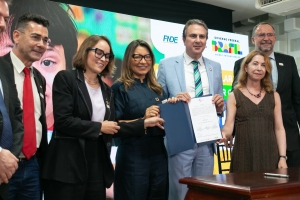Brazilian Government and FAO sign a new cycle of international cooperation in school feeding
For the period 2024-2027, the focus will be on strengthening and expanding the Sustainable School Feeding Network (RAES).

Brasília, Brazil, November 16, 2023 - "This network is the space for dialogue among countries through collective construction and the sharing of challenges and best practices implemented in the region. We will work on the development of national school feeding policies with the governments of each country, so that all can achieve the consolidation of their policies," said the Minister of Education, Camilo Santana, regarding the new cycle of international cooperation between Brazil and the Food and Agriculture Organization of the United Nations (FAO) in school feeding.
The actions developed within the scope of international cooperation have involved the combined efforts and joint work since 2009, between the National Fund for Educational Development of the Ministry of Education (FNDE/MEC), the Brazilian Cooperation Agency of the Ministry of Foreign Affairs (ABC/MRE), and FAO.
The new project that marks the cycle of International Cooperation Brazil-FAO 2024 to 2027 was signed on November 14, during a protocol ceremony at the Ministry of Education headquarters, with the presence of the First Lady of Brazil, Janja Lula da Silva. This new cycle aims to strengthen and expand the actions of the Sustainable School Feeding Network (RAES), in which more than 20 countries in Latin America and the Caribbean actively participate.
According to the minister, RAES also will focus on bringing together the agendas of school and environmental feeding, especially regarding topics related to water and climate change, in addition to addressing healthy school environments, conflicts of interest, and new technologies. In addition to the minister and his team, those present at the event included the president of FNDE, Fernanda Pacobahyba; the representative of FAO in Brazil, Rafael Zavala; the acting director of ABC/MRE, Ambassador Luiza Lopes; and the director of the Center of Excellence against Hunger in Brazil, Daniel Balaban.
The ceremony also included the presence of representatives from the Brazilian parliament, local teams from the federal government ministries, and representatives from the governments of 18 countries in the region who were in Brasília to participate in the event 'School Feeding in Latin America and the Caribbean - history and perspectives.'
The president of FNDE, Fernanda Pacobahyba, mentioned the importance of partnerships for strengthening school feeding policies, not only in Brazil but worldwide. "The National School Feeding Programme, the PNAE, beyond being a national policy, has international recognition and a history of important partnerships with countries in Latin America, the Caribbean, Africa, and Asia. We are sharing and disseminating the fruits of what we have already built," she said.
Pacobahyba stated that RAES is a regional network that shows, with efficiency and results, that international cooperation is a historical reality in our region. She mentioned that Brazil, through global alliances of the Lula government, will co-chair the Global Coalition for School Feeding, along with Finland and France, with the support of various international organizations.
The acting director of ABC/MRE, Ambassador Luiza Lopes, assessed that this type of international cooperation builds "bridges of goodness" with other countries. "It has been a privilege to have this very special sector on our agenda. Itamaraty also cares about hunger, children, and school feeding. We are partners in this joint journey, and for us, it is a privilege to be here in this group," she said. According to the ambassador, it is possible to see how Brazil's experience in school feeding impacts lives.
Rafael Zavala, FAO Representative in Brazil, stated that cooperation in school feeding changes lives and futures for many children from approximately 22 countries. For him, this cooperation has promoted the adequate human right to food within schools, and it can be observed that new governments are motivated to expand their anti-hunger policies. "It is also a very favorable moment for the consolidation of RAES. May the Network be a legacy of the United Nations Decade of Action for Nutrition, not only for Brazil but for the countries in the region. A tangible legacy in terms of public policies. There is no better context for this new cycle of South-South cooperation, for the consolidation of RAES."
School Feeding Ambassador
During the event at MEC, the First Lady Janja Lula da Silva received the title of Ambassador of Brazilian School Feeding, granted by the Minister of Education. She stated that school feeding should be treated as a State policy and praised the role of international cooperation. "Brazil-FAO Cooperation is essential for the country to showcase its National School Feeding Programme to the world, which is universal, and to expand exchanges with other countries in Latin America and the Caribbean. As Ambassador of Brazilian School Feeding, I will work to internationalize our experience in promoting the human right to food and education for all," she commented.
New cycle
Among the objectives of the new work cycle of the Brazil-FAO International Cooperation Program in school feeding are: (i) inclusion of RAES as part of the regional networks supporting the Global Coalition for School Feeding; (ii) expansion of dialogue with regional and global organizations to promote resilient and inclusive food systems; (iii) institutionalisation of RAES as a strategy to reinforce national school feeding policies in Latin America and the Caribbean; (iv) development of a regional school feeding agenda to ensure the human right to adequate food in schools.
